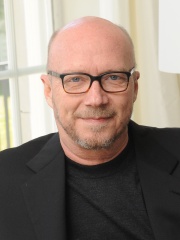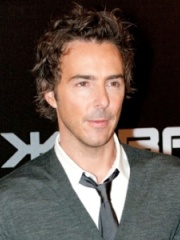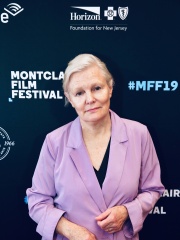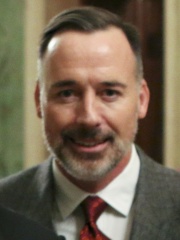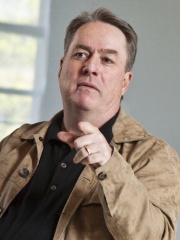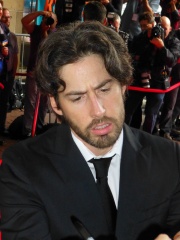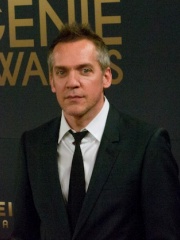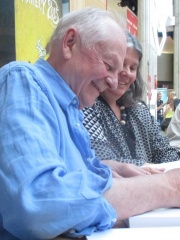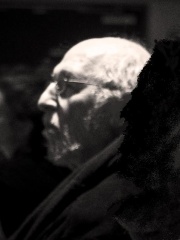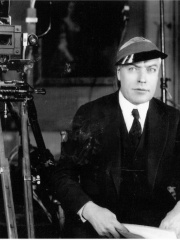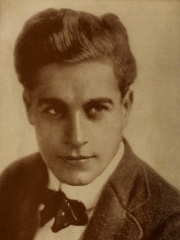
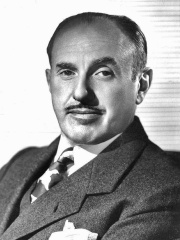
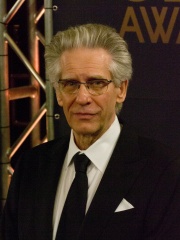
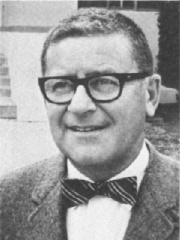

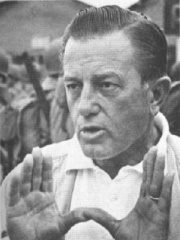
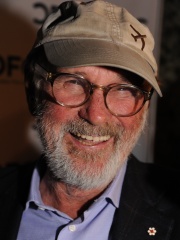
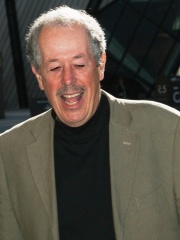
The Most Famous
FILM DIRECTORS from Canada
This page contains a list of the greatest Canadian Film Directors. The pantheon dataset contains 2,041 Film Directors, 35 of which were born in Canada. This makes Canada the birth place of the 12th most number of Film Directors behind Ukraine, and Poland.
Top 10
The following people are considered by Pantheon to be the top 10 most legendary Canadian Film Directors of all time. This list of famous Canadian Film Directors is sorted by HPI (Historical Popularity Index), a metric that aggregates information on a biography's online popularity. Visit the rankings page to view the entire list of Canadian Film Directors.

1. James Cameron (b. 1954)
With an HPI of 75.33, James Cameron is the most famous Canadian Film Director. His biography has been translated into 102 different languages on wikipedia.
James Francis Cameron (born August 16, 1954) is a Canadian filmmaker and deep-sea explorer. A major figure in the post-New Hollywood era, his films combine cutting-edge film technology with classical filmmaking techniques and have grossed over $9 billion worldwide, making him the second-highest-grossing film director of all time. Cameron has received numerous accolades, including three Academy Awards, two Primetime Emmy Awards, and four Golden Globe Awards, as well as nominations for six British Academy Film Awards. Born and raised in Ontario, Cameron moved to California aged 17 and enrolled at Fullerton Community College. Beginning his career with the short film Xenogenesis (1978), he first gained recognition for writing and directing the science fiction action film The Terminator (1984). He had further success with Aliens (1986), The Abyss (1989), Terminator 2: Judgment Day (1991), and True Lies (1994), as well as the Avatar franchise (2009–present). He directed, wrote, co-produced, and co-edited the historical romance epic Titanic (1997), winning Academy Awards for Best Picture, Best Director, and Best Film Editing. Three of Cameron's films—Avatar (2009), Avatar: The Way of Water (2022) and the aforementioned Titanic—are amongst the top four highest-grossing films of all time, with Avatar in the top spot until it was surpassed by Avengers: Endgame (2019), before returning to first place in 2021. He directed the first film to gross over $1 billion, the first two films to gross over $2 billion each, and is the only director to have had three films gross over $2 billion each. The Terminator, Terminator 2: Judgment Day, and Titanic have been selected for preservation in the National Film Registry by the Library of Congress. Cameron also co-founded the production companies Lightstorm Entertainment, Digital Domain, and Earthship Productions. In 2010, Time named Cameron one of the 100 most influential people in the world. In addition to filmmaking, he is a National Geographic explorer-in-residence and has produced many documentaries on deep-ocean exploration, including Ghosts of the Abyss (2003) and Aliens of the Deep (2005). Cameron has also contributed to underwater filming and remote vehicle technologies, and helped create the new digital 3D Fusion Camera System. In 2012, he became the first person to complete a solo descent to the bottom of the Mariana Trench, the deepest part of Earth's ocean, in the Deepsea Challenger submersible. He is also an environmentalist and runs several sustainability businesses.

2. Jack L. Warner (1892 - 1978)
With an HPI of 73.56, Jack L. Warner is the 2nd most famous Canadian Film Director. His biography has been translated into 32 different languages.
Jack Leonard Warner (born Jacob Warner; August 2, 1892 – September 9, 1978) was a Canadian-born American film executive, who was the president and driving force behind the Warner Bros. Studios in Burbank, California. Warner's career spanned over 55 years, surpassing that of any other of the pioneering Hollywood studio moguls. As co-head of production at Warner Bros. Studios, Warner worked with his brother, Sam Warner, to procure the technology for the film industry's first talking picture, The Jazz Singer (1927). After Sam's death, Jack clashed with his surviving older brothers, Harry and Albert Warner. He assumed exclusive control of the company in the 1950s when he secretly purchased his brothers's shares in the business after convincing them to participate in a joint sale of stocks. Although Warner was feared by many of his employees and inspired ridicule with his uneven attempts at humor, he earned respect for his shrewd instincts and tough-mindedness. He recruited many of Warner Bros.' top stars and promoted the hard-edged social dramas for which the studio became known. Given to decisiveness, Warner once commented, "If I'm right fifty-one percent of the time, I'm ahead of the game." Throughout his career, Warner was viewed as a contradictory and enigmatic figure. Although he was a staunch Republican, he encouraged film projects that promoted the policies of Democratic President Franklin D. Roosevelt. He also opposed European fascism and criticized Nazi Germany well before America's involvement in World War II. An opponent of communism, after the war Warner appeared as a friendly witness before the House Un-American Activities Committee, voluntarily naming screenwriters who had been fired at the time as suspected communists or sympathizers. Despite his controversial public image, Warner remained a force in the motion picture industry until his retirement in the early 1970s.

3. David Cronenberg (b. 1943)
With an HPI of 72.38, David Cronenberg is the 3rd most famous Canadian Film Director. His biography has been translated into 57 different languages.
David Paul Cronenberg (born March 15, 1943) is a Canadian film director, screenwriter, producer and actor. He is a principal originator of the body horror genre, with his films exploring visceral bodily transformation, infectious diseases, and the intertwining of the psychological, physical, and technological. Cronenberg is best known for exploring these themes through sci-fi horror films such as Shivers (1975), Scanners (1981), Videodrome (1983) and The Fly (1986), though he has also directed dramas, psychological thrillers and gangster films. Cronenberg's films have polarized critics and audiences alike; he has earned critical acclaim and has sparked controversy for his depictions of gore and violence. The Village Voice called him "the most audacious and challenging narrative director in the English-speaking world". His films have won numerous awards, including the Special Jury Prize for Crash at the 1996 Cannes Film Festival, a unique award that is distinct from the Jury Prize as it is not given annually, but only at the request of the official jury, who in this case gave the award "for originality, for daring, and for audacity". From the 2000s to the 2020s, Cronenberg collaborated on several films with Viggo Mortensen, including A History of Violence (2005), Eastern Promises (2007), A Dangerous Method (2011) and Crimes of the Future (2022). Seven of his films were selected to compete for the Palme d'Or, the most recent being The Shrouds (2024), which was screened at the 2024 Cannes Film Festival.

4. Mark Robson (1913 - 1978)
With an HPI of 66.56, Mark Robson is the 4th most famous Canadian Film Director. His biography has been translated into 26 different languages.
Mark Robson (4 December 1913 – 20 June 1978) was a Canadian-American film director, producer, and editor. Robson began his 45-year career in Hollywood as a film editor. He later began working as a director and producer. He directed 34 films during his career, including Champion (1949), Bright Victory (1951), The Bridges at Toko-Ri (1954), Peyton Place (1957), The Inn of the Sixth Happiness (1958), Von Ryan's Express (1965), Valley of the Dolls (1967), and Earthquake (1974). Robson was twice nominated for the Academy Award for Best Director – for Peyton Place and The Inn of the Sixth Happiness – as well as four nominations for the Directors Guild of America Award for Outstanding Directing in Feature Films. Two of his films were nominated for the Cannes Film Festival's Palme d'Or. In 1960, he received a star on the Hollywood Walk of Fame for his contributions to the motion picture industry.
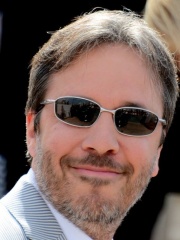
5. Denis Villeneuve (b. 1967)
With an HPI of 64.86, Denis Villeneuve is the 5th most famous Canadian Film Director. His biography has been translated into 59 different languages.
Denis Villeneuve (; French: [dəni vilnœv]; born October 3, 1967) is a Canadian film director and screenwriter. He has received seven Canadian Screen Awards as well as nominations for four Academy Awards, five BAFTA Awards, and two Golden Globe Awards. Villeneuve's films have grossed more than $1.8 billion worldwide. Villeneuve began his career in Quebec cinema, directing four French-language dramas: August 32nd on Earth (1998); Maelström (2000); Polytechnique (2009) and Incendies (2010). The last of these gained him international prominence and earned an Academy Award for Best International Feature Film nomination. He subsequently expanded into English-language films, directing the thrillers Prisoners (2013), Enemy (2013), and Sicario (2015). Like Incendies, each of these was critically acclaimed. Villeneuve has since gained further recognition for directing science fiction films. His work on Arrival (2016) earned an Academy Award for Best Director nomination. This was followed by Blade Runner 2049 (2017), which was critically lauded but financially unsuccessful. His next projects were Dune (2021) and Dune: Part Two (2024), a two-part adaptation of Frank Herbert's novel of the same name that grossed a combined $1.15 billion globally. Both films were critically and commercially successful, earning him two nominations for the Academy Award for Best Picture in addition to a nomination for Best Adapted Screenplay for Dune.

6. Ted Kotcheff (1931 - 2025)
With an HPI of 64.59, Ted Kotcheff is the 6th most famous Canadian Film Director. His biography has been translated into 22 different languages.
William Theodore Kotcheff (Bulgarian: Величко Тодоров Цочев, romanized: Velichko Todorov Tsochev; April 7, 1931 – April 10, 2025) was a Canadian director and producer of film, television, and theatre. He worked at various times in Canada, the United Kingdom, and the United States. He was known for having directed such films as the seminal Australian New Wave picture Wake in Fright (1971), the Mordecai Richler adaptations The Apprenticeship of Duddy Kravitz (1974) and Joshua Then and Now (1985), the original Rambo film First Blood (1982), and the comedies Fun with Dick and Jane (1977), North Dallas Forty (1979), and Weekend at Bernie's (1989). Kotcheff was nominated for a Genie Award for Best Achievement in Direction, a Gemini Award for Best Direction in a Dramatic Program or Mini-Series, and twice for the Cannes Film Festival's Palme d'Or. He won the Golden Bear at the 1974 Berlin International Film Festival for The Apprenticeship of Duddy Kravitz, and the British Academy Television Award for Best Drama Series for his work on Play for Today. He received the Directors Guild of Canada's Lifetime Achievement Award in 2011, and the Academy of Canadian Cinema & Television's Board of Directors' Tribute Award in 2014. He was described by the Toronto International Film Festival as a "talented, multi-faceted journeyman director in the tradition of Leo McCarey or Robert Wise".

7. Edward Dmytryk (1908 - 1999)
With an HPI of 64.54, Edward Dmytryk is the 7th most famous Canadian Film Director. His biography has been translated into 32 different languages.
Edward Dmytryk (September 4, 1908 – July 1, 1999) was a Canadian-born American film director and editor. He was known for his 1940s noir films and received an Oscar nomination for Best Director for Crossfire (1947). In 1947, he was named as one of the Hollywood Ten, a group of blacklisted film industry professionals who refused to testify to the House Un-American Activities Committee (HUAC) in their investigations during the Red Scare of the McCarthy era. They all served time in prison for contempt of Congress. In 1951, Dmytryk testified to the HUAC and named individuals, including Arnold Manoff, whose careers were then destroyed for many years, to rehabilitate his own career. First hired again by independent producer Stanley Kramer in 1952, Dmytryk is likely best known for directing The Caine Mutiny (1954), a critical and commercial success. The second-highest-grossing film of the year, it was nominated for Best Picture and several other awards at the 1955 Oscars. Dmytryk was nominated for a Directors Guild Award for Outstanding Directorial Achievement in Motion Pictures.

8. Norman Jewison (1926 - 2024)
With an HPI of 64.23, Norman Jewison is the 8th most famous Canadian Film Director. His biography has been translated into 46 different languages.
Norman Frederick Jewison (July 21, 1926 – January 20, 2024) was a Canadian filmmaker. He is known for directing films which addressed topical social and political issues, often making controversial or complicated subjects accessible to mainstream audiences. Among numerous other accolades, he was nominated for the Academy Award for Best Director three times in three separate decades, for In the Heat of the Night (1967), Fiddler on the Roof (1971), and Moonstruck (1987). He was nominated for an additional four Oscars, three Golden Globe Awards, and a Primetime Emmy Award, and won a BAFTA Award. He received the Academy of Motion Pictures Arts and Sciences's Irving G. Thalberg Memorial Award in 1999. Born and raised in Toronto, Jewison began his career at CBC Television in the 1950s, moving to the United States later in the decade to work at NBC. He made his feature film debut in 1962, with the comedy 40 Pounds of Trouble, and embarked on a motion picture directing career that spanned over 40 years. His notable films included The Cincinnati Kid (1965), The Russians Are Coming, the Russians Are Coming (1966), In The Heat of the Night (1967),The Thomas Crown Affair (1968), Jesus Christ Superstar (1973), Rollerball (1975), F.I.S.T. (1978), ...And Justice for All (1979), A Soldier's Story (1984), Agnes of God (1985), and The Hurricane (1999). In 1988, Jewison founded the Canadian Film Centre. In 2003, he received the Governor General's Performing Arts Award for Lifetime Artistic Achievement for his multiple contributions to the film industry in Canada. He was Chancellor of Victoria University in the University of Toronto, his alma mater, from 2004 until 2010. For four decades he worked out of a 5th floor office in his home at 18 Gloucester Street, a former furniture factory. In 2001 City of Toronto honored Jewison by naming Norman Jewison Park across the street in his honor. In 2023 the Hazelton Hotel named its screening room after him.

9. Denys Arcand (b. 1941)
With an HPI of 62.83, Denys Arcand is the 9th most famous Canadian Film Director. His biography has been translated into 27 different languages.
Georges-Henri Denys Arcand (French: [dəni aʁkɑ̃]; born June 25, 1941) is a Canadian filmmaker. During his four decades career, he became one of the most internationally-recognized directors from Quebec, earning widespread acclaim and numerous accolades for his "intensely personal, challenging, and intellectual films." His film The Barbarian Invasions won the Academy Award for Best Foreign Language Film in 2004. His films have also been nominated three further times, including two nominations in the same category for The Decline of the American Empire in 1986 and Jesus of Montreal in 1989, becoming the only French-Canadian director in history whose films have received this number of nominations and, subsequently, to have a film win the award. For The Barbarian Invasions, he received an Academy Award nomination for Best Original Screenplay, losing to Sofia Coppola for Lost in Translation. Arcand has also won several awards from the Cannes Film Festival, including the Best Screenplay Award, the Jury Prize, and many other prestigious awards worldwide. He won three César Awards in 2004 for The Barbarian Invasions: Best Director, Best Original Screenplay or Adaptation and Best Film, the only Canadian director to have done so. He is a member of the Royal Canadian Academy of Arts, and a Commander of the French Ordre des Arts et des Lettres.
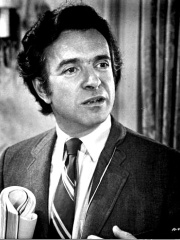
10. Arthur Hiller (1923 - 2016)
With an HPI of 60.45, Arthur Hiller is the 10th most famous Canadian Film Director. His biography has been translated into 30 different languages.
Arthur Hiller, (November 22, 1923 – August 17, 2016) was a Canadian film and television director. He directed over 33 feature films during a 50-year career. He began his career directing television in Canada and later in the U.S. By the late 1950s, he was directing films, most often comedies, but also dramas and romantic subjects, such as in Love Story (1970), which was nominated for seven Academy Awards, including for Best Director. Hiller collaborated on films with screenwriters Paddy Chayefsky and Neil Simon. Among his other notable films were The Americanization of Emily (1964), Tobruk (1967), The Hospital (1971), The Out-of-Towners (1970), Plaza Suite (1971), The Man in the Glass Booth (1975), Silver Streak (1976), The In-Laws (1979), Making Love (1982), and Outrageous Fortune (1987). Hiller served as the 19th President of the Directors Guild of America from 1989 to 1993 and President of the Academy of Motion Picture Arts and Sciences from 1993 to 1997. He was the recipient of the Jean Hersholt Humanitarian Award in 2002. An annual film festival in Hiller's honor was held from 2006 until 2009 at his alma mater, Victoria School of Performing and Visual Arts.
People
Pantheon has 35 people classified as Canadian film directors born between 1872 and 2000. Of these 35, 23 (65.71%) of them are still alive today. The most famous living Canadian film directors include James Cameron, David Cronenberg, and Denis Villeneuve. The most famous deceased Canadian film directors include Jack L. Warner, Mark Robson, and Ted Kotcheff. As of April 2024, 1 new Canadian film directors have been added to Pantheon including Jeremy Podeswa.
Living Canadian Film Directors
Go to all RankingsJames Cameron
1954 - Present
HPI: 75.33
David Cronenberg
1943 - Present
HPI: 72.38
Denis Villeneuve
1967 - Present
HPI: 64.86
Denys Arcand
1941 - Present
HPI: 62.83
Paul Haggis
1953 - Present
HPI: 60.30
Roger Spottiswoode
1945 - Present
HPI: 59.55
Shawn Levy
1968 - Present
HPI: 56.42
Mary Harron
1953 - Present
HPI: 55.84
David Furnish
1962 - Present
HPI: 53.85
Robert Lepage
1957 - Present
HPI: 52.53
Brad Wright
1961 - Present
HPI: 50.38
Jason Reitman
1977 - Present
HPI: 49.42
Deceased Canadian Film Directors
Go to all RankingsJack L. Warner
1892 - 1978
HPI: 73.56
Mark Robson
1913 - 1978
HPI: 66.56
Ted Kotcheff
1931 - 2025
HPI: 64.59
Edward Dmytryk
1908 - 1999
HPI: 64.54
Norman Jewison
1926 - 2024
HPI: 64.23
Arthur Hiller
1923 - 2016
HPI: 60.45
Allan Dwan
1885 - 1981
HPI: 58.49
Jean-Marc Vallée
1963 - 2021
HPI: 55.42
Richard Williams
1933 - 2019
HPI: 55.06
Michel Brault
1928 - 2013
HPI: 53.48
Sidney Olcott
1872 - 1949
HPI: 52.65
Elmer Clifton
1890 - 1949
HPI: 52.55
Newly Added Canadian Film Directors (2025)
Go to all RankingsOverlapping Lives
Which Film Directors were alive at the same time? This visualization shows the lifespans of the 12 most globally memorable Film Directors since 1700.

